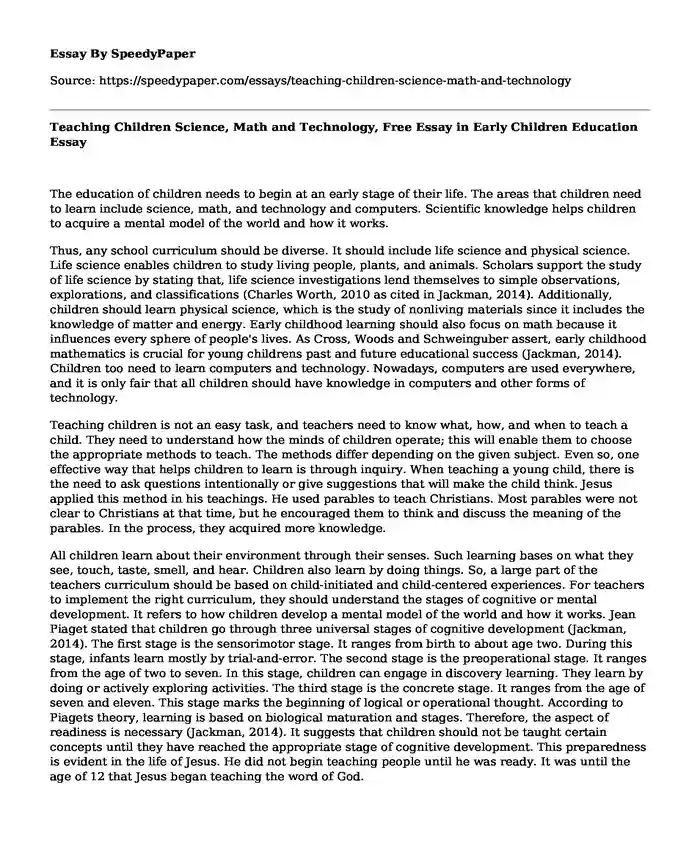
| Type of paper: | Essay |
| Categories: | Teaching Child development |
| Pages: | 3 |
| Wordcount: | 642 words |
The education of children needs to begin at an early stage of their life. The areas that children need to learn include science, math, and technology and computers. Scientific knowledge helps children to acquire a mental model of the world and how it works.
Thus, any school curriculum should be diverse. It should include life science and physical science. Life science enables children to study living people, plants, and animals. Scholars support the study of life science by stating that, life science investigations lend themselves to simple observations, explorations, and classifications (Charles Worth, 2010 as cited in Jackman, 2014). Additionally, children should learn physical science, which is the study of nonliving materials since it includes the knowledge of matter and energy. Early childhood learning should also focus on math because it influences every sphere of people's lives. As Cross, Woods and Schweinguber assert, early childhood mathematics is crucial for young childrens past and future educational success (Jackman, 2014). Children too need to learn computers and technology. Nowadays, computers are used everywhere, and it is only fair that all children should have knowledge in computers and other forms of technology.
Teaching children is not an easy task, and teachers need to know what, how, and when to teach a child. They need to understand how the minds of children operate; this will enable them to choose the appropriate methods to teach. The methods differ depending on the given subject. Even so, one effective way that helps children to learn is through inquiry. When teaching a young child, there is the need to ask questions intentionally or give suggestions that will make the child think. Jesus applied this method in his teachings. He used parables to teach Christians. Most parables were not clear to Christians at that time, but he encouraged them to think and discuss the meaning of the parables. In the process, they acquired more knowledge.
All children learn about their environment through their senses. Such learning bases on what they see, touch, taste, smell, and hear. Children also learn by doing things. So, a large part of the teachers curriculum should be based on child-initiated and child-centered experiences. For teachers to implement the right curriculum, they should understand the stages of cognitive or mental development. It refers to how children develop a mental model of the world and how it works. Jean Piaget stated that children go through three universal stages of cognitive development (Jackman, 2014). The first stage is the sensorimotor stage. It ranges from birth to about age two. During this stage, infants learn mostly by trial-and-error. The second stage is the preoperational stage. It ranges from the age of two to seven. In this stage, children can engage in discovery learning. They learn by doing or actively exploring activities. The third stage is the concrete stage. It ranges from the age of seven and eleven. This stage marks the beginning of logical or operational thought. According to Piagets theory, learning is based on biological maturation and stages. Therefore, the aspect of readiness is necessary (Jackman, 2014). It suggests that children should not be taught certain concepts until they have reached the appropriate stage of cognitive development. This preparedness is evident in the life of Jesus. He did not begin teaching people until he was ready. It was until the age of 12 that Jesus began teaching the word of God.
Children should acquire education as much as possible. However, the learning process should focus on only important scopes of their lives. It is important for them to have the knowledge that enables them to relate well with others and their environment. More so, the subject of acquiring knowledge is supported in the bible. The scriptures say, My people perish because they lack knowledge (Hosea 4:6, New International Version).
References
Jackman, H. L. (2014). Early education curriculum: A child's connection to the world. Albany: Delmar Publishers.
Cite this page
Teaching Children Science, Math and Technology, Free Essay in Early Children Education. (2019, Sep 30). Retrieved from https://speedypaper.com/essays/teaching-children-science-math-and-technology
Request Removal
If you are the original author of this essay and no longer wish to have it published on the SpeedyPaper website, please click below to request its removal:
- Free Essay Example on Our Moral Obligations to Earth
- Onboarding Process - Free Essay in HRM
- Essay Sample on Differentiating Music
- The Effects of War and Peace on Foreign Aid
- Home Sweet Home - Free Essay on the Short Animated Film
- Free Essay on the Change of Technology and the Retail Banking Industry
- Free Essay Sample: Product Overview of Salubite
Popular categories




